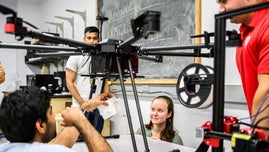
WPI awarded $600K to develop 3D-printed search-and-rescue robots
 Photo | Courtesy Worcester Polytechnic Institute
WPI assistant professor Markus Nemitz
Photo | Courtesy Worcester Polytechnic Institute
WPI assistant professor Markus Nemitz
Worcester Polytechnic Institute researcher Markus Nemitz has received a $599,815 award from the National Science Foundation to advance the development of low-cost 3D-printed robots, fleets of which could be quickly fabricated and deployed around the world in the case of disasters requiring search-and-rescue operations.
The soft, flexible robots would be adaptable to different conditions hostile or inaccessible to human rescuers. They would vary in scale from the size of a mouse to the size of a basketball and would be capable of swimming, crawling, climbing, and diving across challenging terrains, according to a Monday press release from WPI.

“There lies immense potential in the development of small robots that are quickly fabricated from soft, flexible materials,” Nemitz, an assistant professor, said in the press release. “These robots can significantly aid rescue efforts by exploring areas that pose potential hazards to humans or are otherwise inaccessible, including earthquake debris, flooded regions, and even nuclear accident sites.”
Over the course of the five-year project, Nemitz will test his creation in a model replicating sections of the Tham Luang cave in Thailand, where flooding trapped 12 members of a youth soccer team and their coach in 2018.
“Robots can go to places beyond human reach,” Nemitz said. “Equipped with sensors such as microphones and cameras, these robots will enhance the capabilities of rescuers, especially during natural disasters. To ensure a dynamic and rapid response to emergencies, we must continually innovate and develop new technologies. Robotics is at the forefront of this development.”
The award was made possible through the NSF’s Faculty Early Career Development (CAREER) Program, which offers funding to approximately 500 projects annually.













0 Comments